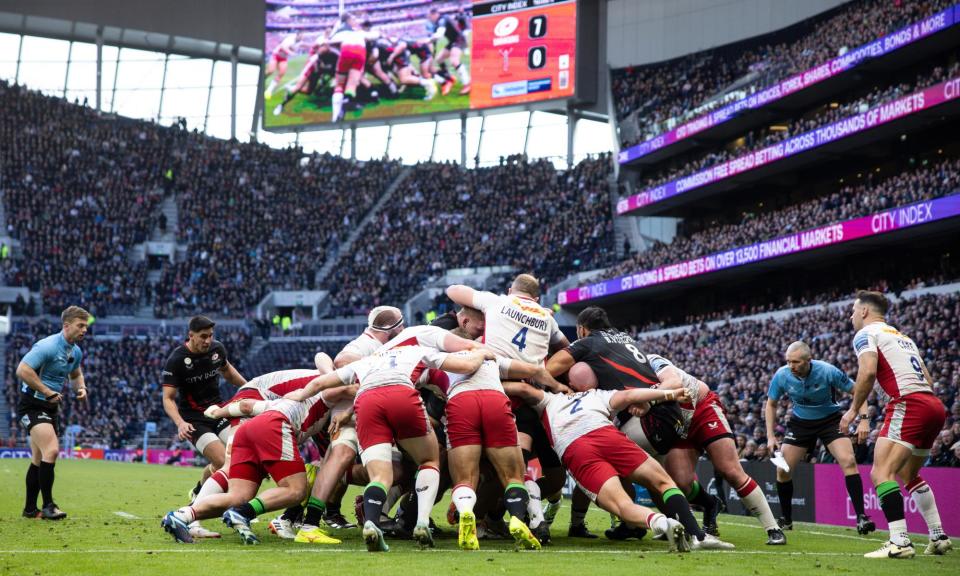Tales of the unexpected: why club rugby is seeing rollercoaster results

A few of us were chatting the other day with Rob Baxter, Exeter Chief’s director of rugby, about the toughest challenge in rugby. We all probably have a personal opinion on the subject: physically trying to stop a massive onrushing forward two metres from your own line, say, or having to kick a last-minute winning penalty into the teeth of a Galway gale from 50 metres.
Baxter, though, was talking more generally and coming at the question from a seasoned coach’s perspective. In his opinion the most difficult obstacles to overcome are often mental. Not least the art of preparing to face opponents whom you steamrollered last time you played them. “Doubling up on games you’ve had a good result in is the hardest thing to do in rugby,” insisted Baxter. “The amount of times I’ve been involved, either playing or coaching, when you’ve won by 30 points one week and the next time it’s so different.”
Related: Leicester Tigers fined for breaching salary cap in 2019-20 season
He had in mind this weekend’s Champions Cup last-16 tie between Bordeaux and Saracens. When Sarries visited the Stade Jacques Chaban-Delmas in January they lost 55-15. So a guaranteed home win awaits this Saturday, then? Not so, in Baxter’s experience. “There’s no doubt that Bordeaux tanking Saracens in the pool stages is the worst game for them to get back again. Saracens will be in a completely different place, they’ll be going to war. Bordeaux will be thinking: ‘Play like we did last time, throw it around a bit, score a few tries, this’ll be great.’”
But, then again, who can say precisely which version of Saracens will turn up? The team who looked totally irresistible when they stuck 50 points on a hapless Harlequins at Tottenham Hotspur Stadium or the well-beaten mob who shipped 40 points at Northampton last Friday night? Bordeaux, meanwhile, did brilliantly to overcome title-chasing Toulouse in the Top 14 last month, only to be firmly put in their place by lowly Lyon at the weekend.
Up, down, in, out … if you are looking for a sport with plenty of hokey cokey jeopardy then rugby union is currently hard to beat. What goes up one week is liable to descend the next. The aforementioned Quins, so lacklustre against Sarries, were so good at home to Bath they were 40-3 up early in the second half only for the visitors to score 33 unanswered points in the last half hour. Try explaining that away without dialling the number of the team psychologist.
There are clearly some plausible explanations for these stark variations. The home and away factor, for one. Squad rotation for another. It might seem common sense, after a huge win, to sub in a couple of fresh bodies but a team’s chemistry can be surprisingly delicate. Equally, keeping the exact same XV does not always yield identical results. As Baxter was implying, mindset counts for every bit as much as personnel.
The old Heineken Cup format of home and away pool fixtures on consecutive weeks was a good example, with the outcomes often varying ludicrously from one week to the next. Take a team like Ulster: they would go somewhere like Leicester and lose by a double-digit number before sticking 40 points on them back at Ravenhill. Perhaps the ultimate example was in 2003-04 when they thrashed the Tigers 33-0 in Belfast – only to go to Welford Road the following weekend and go down 49-7.
It is not just a home-and-away thing, though. There are all sorts of other intangibles, from disrupted preparation and contractual distractions to matchday traffic jams and sickly family members. Life is seldom a straight line and neither is rugby. Crucially, too, there are loads of smart analysts out there endlessly poring over mountains of video footage. What worked last week – or even half an hour ago – can be shut down quicker than you can say Steve Borthwick.
Then there is the fickle, knife-edge nature of the modern game itself. Increasingly you feel for coaches as they struggle to rationalise exactly how their bunch of lads went from heroes to zeroes inside half an afternoon. When Quins staged their famous “Brist-anbul” comeback from 28-0 down in the Premiership semi-final of 2021, it felt like a once-in-a-lifetime achievement. Nowadays sides are bouncing back from the edge of oblivion most weeks.
Because momentum can be devilishly hard to stop if, say, the penalty count dries up and it is no longer possible to kick to the corner, win a lineout and turn the screw. Which is why the incident in the Quins-Bath game, when the prop Irné Herbst was allowed back prematurely from the sin-bin, was a complete shocker. It is less about the actual tackles Herbst made when he was back on the field illegally than the wider range of options open to an increasingly rampant Bath had he stayed off.
So while, at first glance, the majority of Champions Cup last 16 ties look likelier to be won by the home sides, it is not quite that simple. Bordeaux will not hump Sarries so easily this time because rugby rarely works like that. Northampton may have beaten Munster in Thomond Park in January but when the first whistle blows at Franklin’s Gardens this weekend that will count for nothing. Which brings us back to the toughest task, bar none, in rugby. The answer is obvious: refereeing a big game without making a solitary mistake in the eyes of all present. Professional rugby union has existed for almost 30 years and it is still yet to happen.
This is an extract taken from our weekly rugby union email, the Breakdown. To sign up, just visit this page and follow the instructions.
